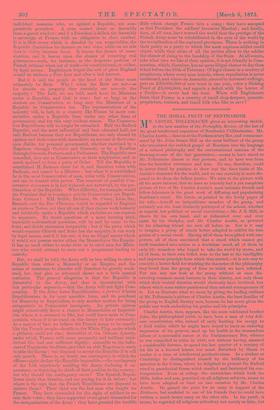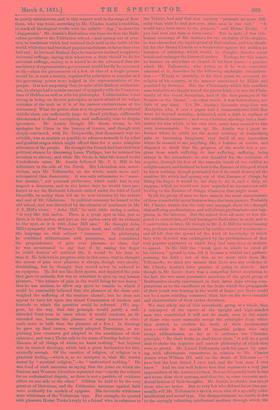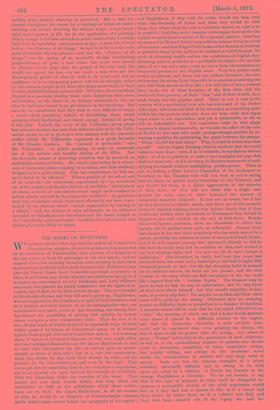THE MORAL FRUIT OF BENTHAMISM.
'VER.i LIONEL TOLLEMACHE gives an interesting sketch, JL in the new number of the Fortnightly Review, of the last of the great intellectual expositors of Bentham's Utilitarianism. Mr. Charles Austin,—famous at the Parliamentary Bar, and commemo- rated by Mr. John Stuart Mill as the most brilliant of the group who translated the crabbed gospel of Bentham into the language of a refined philosophy and the conversational maxims of the drawing-rooms of the last generation,—seems to have stood to Mr. Tollemache almost in loco parentis, and to have won from him the heartiest reverence and love. No one, therefore, could be better fitted by position to draw out the finer traits of Mr. Austin's character for the world, and no one certainly is more dis- posed to do them the fullest justice. We turn to the picture with all the more interest, that we have so recently had a yet completer picture of two of Mr. Charles Austin's most intimate friends and fellow-labourers in the great work of diffusing and popularising Bentham's creed. Mr. Grote, as painted in the lively pages of his wife,—herself no, insignificant member of the group, and certainly not the least distinctly portrayed of the school, whether as regards her political or moral convictions,—Mr. J. S. Mill, as drawn by his own hand, and as delineated over and over again by his disciples, and Mr. Charles Austin, as pictured by his admiring friend, are now all before us. Nor is it easy to imagine a group of minds better adapted to exhibit the true genius of a moral creed. Having all of them been gifted with rare powers, all of them convinced that a creed which cannot get itself translated into action is a worthless creed, all of them in early life crusaders who hoped to take the world by storm, and all of them, in their own belief, true to the last to the intelligible and imperious principle from which they started,—it is not easy to conceive a better field for studying the character of the philosophy they loved than the group of lives to which we have referred. Nor can any one look at the group without at once dis- covering common moral features in their history, not only those which their central doctrine would obviously have involved, but others which seem rather paradoxical than natural consequences of it. Let us illustrate what we mean by giving the leading outlines of Mr. Tollemache's picture of Charles Austin, the least familiar of the group to English literary men, because be has never given the public any work embodying his genius and his principles.
Charles Austin, then, appears, like his more celebrated brother John, the philosophical jurist, to have been a man of very deli- cate constitution, who, instead of early limiting his energy to a field within which he might have hoped to leave an enduring impression of his powers, used up his health in the tremendous labour of a successful career at the Parliamentary Bar, whence he was compelled to retire in 1848, not without having amassed a considerable fortune, to spend the last quarter of a century of his life in a learned leisure too much disturbed by illness to render it a time of intellectual productiveness. As a student at Cambridge he distinguished himself by the brilliancy of his speeches in the Union, where he delighted to present the Radical creed in paradoxical forms which startled and fascinated his con- temporaries. Even at college the esotericism which both the Mills, father and son, practised on all religious subjects, seems to have been adopted at least on one occasion by Mr. Charles Austin. He gained the prize for an essay in support of the Evidences, but confided to one of his friends that he could have written a much better essay on the other side. In his youth, it seems, he regarded all religious orthodoxy not merely as false, but as purely mischievous, and in this respect trod in the steps of Ben- tham, who was wont, according to Mr. Charles Austin's tradition, to mark all theological works with the syllable "Jug.," as short for ' Juggernaut.' Mr. Austin's Radicalism was from the first the Radi- calism peculiar to the Utilitarian school,—and sprang out of aver- sion to traditions which had retained their hold on the habit of the world, while they had lost their popular usefulness, so far as they ever had any. In his most Radical days he was never inclined to approve universal suffrage, saying that whenever a State should be fit for universal suffrage, society in it would be so far advanced that the machinery of representative government would hardly be necessary at all,—since the government of a few, or that of a single person, would' be, in such a society, regulated by principles as popular as if the governing power were lodged in the representatives of the people. It is not surprising that, in spite of his Radical utilitarian- ism, he always had a certain amount of sympathy with the Conserva- tism of Hobbes as well as with his philosophy. Utilitarianism is not wrong in being, on its own principles, as much afraid of the vulgar mistakes of the mob as it is of the narrow exclusiveness of the aristocracy. What its genius aims at is the government of a rational middle-class, one sufficiently large to dread privilege, sufficiently disinterested to dread corruption, and sufficiently wise to despise ignorance. Mr. Austin thought Mr. Grote wrong in his apologies for Cleon in the history of Greece, and though very deeply convinced, with. De Tocqueville, that democracy was in- evitable, was as anxious as possible to advance towards it by sober and gradual stages which might afford time for a more complete education of the people. He thought the French had lost their best political chance by dismissing Louis Philippe, but he retained his aversion to slavery, and while Mr. Grote in later life leaned to the Confederate cause, Mr. Austin followed Mr. J. S. Mill in his adherence to the side . of the North. His Liberalism was, never- theless, says Mr. Tollemache, on the whole, much more anti- eclesiastieal than democratic. It was only submission to " mani- fest destiny," not personal preference, which made him in any respect a democrat, and in the latter days he would have pre- ferred to see the Moderate Liberals united under the lead of Lord Granville, to seeing them led on to new victories by the ardour and zeal of Mr. Gladstone. In political economy he leaned to the old school, and was disturbed by the element of sentiment in Mr. J. S. Mill's views. "John Mill," he said, while eating a melon, "is very like this melon. There is a great spot in him, just as there is in the melon, and just as the melon owes all its richness to the spot, so it is with John Mill also." He thought John Mill's sympathy with Women's Rights weak, and called most of the language on that subject " nauseous." In philosophy he combined utilitarianism with pessimism, and considered the preponderance of pain over pleasure so clear, that he was accustomed to say that if by raising his finger he could destroy all sentient life, it would be his duty to raise it. He believed is progress only in this sense, that he thought the excess of pain over pleasure is always, theTug,h very slowly, diminishing, but he thought they would never be reduced to an equipoise. He did not like field sports, and deplored the pain they gave to animals, but was so reluctant to give up any human pleasure, "the balance of pain in the world being far too heavy," that he was anxious to allow any sport to remain in which it could be reasonably believed that the pleasure of the chase out- weighed the suffering of the creature chased ; but he does not appear to have hit upon any mixed Commission of hunters and hunteds to which the question could be referred. (We sup- pose, by the way, that this principle would justify a well- attended hunt even in cases where it would condemn an ill- attended one, because the pleasure of many bunters is obvi- ously more in bulk than the pleasure of a few.) In theology he gave up final causes, warmly adopted Darwinism, as ex- plaining how creatures get adapted to the conditions of their existence, and was a Theist only in the sense of bowing before "the Essence of all things of whom we know nothing," but beyond this he treated theology, which had a great fascination for him, cynically enough. Of the emotion of religion, of religion as a practical feeling,—which is, as we interpret it, what Mr. Austin meant by "mystical religion,"—he "understood nothing." He was fond of such sarcasms as saying that the point on which the Eastern and Western Churches separated was "exactly the subject for an ecclesiastical dispute, as there is not a particle of evidence either on one side or the other." Gibbon he held to be the very greatest of historians, and the Gibbonian sarcasms against faith were evidently his models of epigram. His favourite witticisms were witticisms of the Voltairean type. For example, he quoted with pleasure Home Tooke's reply to a friend who, in reference to
the Trinity, had said that that mystery " presents no more diffi- culty than what he had just seen, three men in one cart." " It would have been more to the purpose," said Horne Tooke, " if you had seen one man in three carts." But in spite of this Gib- bonian contempt of Mr. Austin's for the credulity of theologians, he was alarmed at the rapid spread of Rationalism, and was thank- ful for the Broad Church as a breakwater against too sudden an invasion of infidelity, which would, he thought, dissolve social bonds and endanger the future of society. Perhaps for this reason he became an attendant at church in his later years,—a practice which Mr. Tollemache, who writes as if he were somewhat ashamed of it, describes by the following euphuistic circumlocu- tion :—" Wisely or unwisely, in his later years he accepted the religion of his country, in the manner sanctioned by Elijah and practised by Socrates. But the Christianity which this excellent man wished to see taught was of the purest kind,—it was the Chris- tianity of the Good Samaritan, and of the best passages of the Sermon on the Mount,"—in other words, it was benevolence, not faith of any kind. Yet Mr. Austin's favourite tragedian was Aschylus, who, if ever a pagan had a transcendental faith that went far beyond morality, delineated such a faith in outlines of the sublimest character ; and even Christian theology had a fasci- nation for him which, in his own view, must have seemed to him very unreasonable. To sum up, Mr. Austin was a great re- former where be could see the moral certainty of diminishing pain or increasing happiness, very timid of any innovation where he seemed to see anything like a balance of results, and disposed to think that the progress of the world was a pro- gress from much suffering to less suffering, suffering being always in the ascendant ; he was thankful for the reticence of sceptics, through his fear of the anarchic result of too sudden an enlightenment, and inclined to bow to the Essence of things of which he knew nothing, though persuaded that if he could destroy all the sensitive life which had sprung out of that Essence of things, by lifting his finger, it would be his duty to do it, and a duty, we suppose, which he would not have regarded as inconsistent with bowing to the Essence of things, whatever that might mean.
In all the group of men we have named, the most characteristic of these remarkable moral features have also been present. Probably Mr. Charles Austin was the only one amongst them who thought that suffering predominates, and will always predominate over hap- piness, in the universe. But the school were all more or less dis- posed to esotericism, all had leanings to Radicalism in early, and to Conservatism in later, life though in Mr. J. S. Mill the latter leaning was, perhaps, more than balanced by sudden waves of sentiment,— and all felt that the spread of the kind of knowledge to which they were devoted was endangered by the predominance of that very popular sentiment to which they had once been so anxious to appeal. In Mr. Mill the " weak spot to which he owed all his richness " spread in him, till it became a wistful and pathetic yearning for faith ; but of this, as we must infer from Mr. Tollemache, we must not assume that there was any evidence in Mr. Charles Austin's later practice of going to church. And though in Mr. Grote there was a somewhat bitter scepticism to the last, the two most persuasive members of the great group of Benthamites clearly entertained in their latter days strong com- punctions as to the excellence of the fruits which the propaganda of their youth was bearing in the world at large ; yet there could not be a more startling comment than this on the most essential and characteristic of their earlier doctrines.
We may safely say of this remarkable group as a whole, that a retrospect of the career of the upright and high-minded men who constituted it will not do much, even in the minds of those who most earnestly accept the principles from which they started, to confirm the truth of their fundamental view ;—while in the minds of impartial judges who only accept utilitarianism so far as it endorses the Christian principle, " By their fruits ye shall know them," it will do a good deal to shake the negative and narrow philosophy of which they were so proud. Mr. Lionel Tollemache ends his paper by quot- ing with affectionate earnestness in relation to Mr. Charles Austin what William III. said on the death of Tillotson :—" I have lost the best friend I ever had, and the best man I ever knew." And we can well believe that that represents a very just appreciation of Mr. Austin's virtues. Men are frequently both better and worse than their systems, and than the, in. some respects, acci- dental fashion of their thoughts. Mr. Austin, no doubt, was one of those who are better. But to very few who did not know him per- sonally will Mr. Tollemache's sketch seem that of a specially noble intellectual and moral type. The disappointment, no doubt, is due to the strongly refracting intellectual medium through which the
nobility of the interior character is perceived. But a man fas- cinated throughout his career by a theology at which his under- standing was always directing the wittiest scorn ; a man whose chief motive-power in life lay in the application of a principle which, though it led him onwards in youth, induced him to shrink back from its inevitable consequences in age ; a man who bowed before " the Essence of all things," though he held that the only good of sentient life was pleasure, and that the " Essence of all things " was the spring of an inevitable though diminishing preponderance of pain ; a man whose last years were passed in clinging to the hope that the gospel of his own early life would not spread too fast,—in one word, a man who saw the disintegrating power of what he held to be truth, and had no confidence in its re-integrating power, will not be thought, either by the common people or by those who judge most wisely, to have lived an ideal intellectual and moral life. Of course, there is nothing illogical in a pessimist finding truth more dangerous than error, and learning, as life draws on, to whisper cautiously in the ear what be had once hoped to see proclaimed on the housetops. But men are so constituted that they find it very difficult to accept a creed which paralyses, instead of stimulating, them, which minimises their intellectual and moral energy, instead of giving it full play. Indeed, the story of the Utilitarian group whose last eminent member has just been delineated for us by Mr. Tolle- mache, seems to us to present a close analogy with the oratorical artifice which Mr. Tollemache represents as a great favourite of Mr. Charles Austin's. He deemed it serviceable," says Mr. Tollemache, " in public speaking, to make an occasional use of the archaic and familiar diction of the Bible. But his favourite means of attracting attention was by means of an artistically-contrived bathos. He raised expectation by a succes- sion of rhetorical phrases tending to a climax, and then suddenly dropped into a quiet ending. This last contrivance, he told me, never failed to be effective." What a parable of the school and of its methods !—its esotericism represented by " an occasional use of the archaic and familiar diction of the Bible," which raised, of course, a cloud of associations whose magic spell consisted in beliefs utterly rejected by the orator who wielded it ; the great and very just revolution which these men effected in our laws, repre- sented by the rhetoric which " raised expectation by tending to a climax "; and the destiny of their philosophy as an influence intended to transfigure the conscience and the heart, imaged in the " artistically-contrived bathos " in which the reputation of that philosophy seems likely to expire.




































 Previous page
Previous page